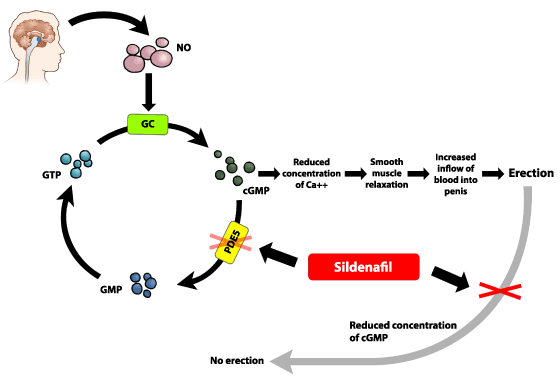Drugs are the most popular treatment option for men suffering from erectile dysfunction. However, some doctors believed that use of these medications can lead to an increased risk of melanoma. As per the results of a study, it has been conclusively determined that lifestyle factors are responsible for the increase and not the drugs themselves.
Why do people think ED drugs and melanoma are related?
A study in 2014 had determined that there were links between the drugs used for treating erectile dysfunction and melanoma. The study involved 25,848 men. In the group, the men using ED drugs like Viagra had an increased risk of developing melanoma.
It was believed that the way ED drugs work is the cause of melanoma. In melanoma, the extracellular signal-regulated kinase signaling pathway and the RAS/RAF/mitogen-activated protein kinase are involved in the proliferation as well as the survival of the malignant cells. PDE5A inhibitors, the most common type of ED drugs, also work with that pathway. This was responsible for the belief that the drugs are capable of promoting malignant melanoma.

The new study
In the new study, the results suggested that lifestyle factors are the reason why men using PDE5 inhibitors have a slightly increased risk of suffering from malignant melanoma. However, there was one point in the data that made the researchers curious.
The risk of melanoma was the highest in patients who had only a single prescription for these drugs. People who had to go for multiple prescriptions did not have such a high risk. For that reason, the researchers concluded that the risks of melanoma were linked with demographic or lifestyle factors rather than the use of ED drugs.
PDE-5 inhibitors for ED Treatment
PDE5 inhibitors are substances that can block the action of a specific enzyme called phosphodiesterase-5. This enzyme is present in the smooth muscle cells of the blood vessels.
The smooth muscle cells contain a compound called GMP. When nitric oxide is produced and enters the cells, the GMP is converted into cyclic GMP, or cGMP in short, which ends up causing an erection. The levels of cGMP can be reduced by phosphodiesterase-5. By using a PDE5 inhibitor, the cGMP levels can be maintained as phosphodiesterase-5 itself is blocked.
By maintaining the cGMP levels, the blood vessels are able to dilate. In turn, blood is able to flow more easily through the blood vessels. This is applicable to the penile region as well. As the penis gets more blood, it is able to achieve an erection.
What are the most popular PDE-5 inhibitors
The most popular PDE-5 inhibitors are available at Canadian Health&Care Mall:
- Viagra;
- Cialis;
- Levitra;
- Kamagra
These medications are considered to be effective in the majority of cases. In fact, they are known to be effective in 70% of the cases of erectile dysfunction. People who have used these medicines are known to consider them rather satisfying as well.

Drug interactions and other precautions
In spite of the effectiveness of these oral medications, the fact is that they need to be consumed with care. A doctor has to be consulted and a prescription obtained before using them. After all, drug interactions are possible.
People who are taking nitrates for heart conditions should not use these oral medications. ED drugs can lower the blood pressure. Nitrates have the same effect on the body. As a result, using both of them together can lead to a massive drop in blood pressure. This can be fatal in some cases.
Drug interactions with alpha-blockers are also possible. Therefore, consult a doctor before purchasing these medications. There are also certain health conditions which can be affected by the use of these drugs leading to adverse reactions. A doctor will be able to guide you through the appropriate treatment in such cases.
Side effects
PDE5 inhibitors can have side effects when consumed. These side effects are rare but some of them can be quite serious. Some of them are given below.
- Upset stomach;
- Indigestion;
- Loss of hearing;
- Loss of vision;
- Abnormal vision;
- Headaches;
- Flushing;
- Diarrhea;
- Rash;
- Back pain;
- Muscular pain;
- Allergic reactions



